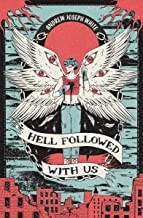Alex Cabe reviewed Hell Followed with Us by Andrew Joseph White
Body Horror Book, Not a Cult Book
2 stars
I was excited about this book because I expected it to be primarily about cults, but it was much more of a body horror/monster book.
The thing I look for in a work about cults in some understanding off why people joined the cult. Cults appeal to psychological vulnerabilities, and everyone has them. For, e.g., The People's Temple or Heaven's Gate, I primarily see the grave evil they did while still understanding what they offered and how they convinced people they were improving the world and themselves. The Angels are all stick and no carrot. I don't see what their members get out of it. I don't exactly need their systematic theology, but I need to know more about how they arrived at such an extreme belief and what's in it for the common person in the pews. A simple change here would be to make the Angels the only …
I was excited about this book because I expected it to be primarily about cults, but it was much more of a body horror/monster book.
The thing I look for in a work about cults in some understanding off why people joined the cult. Cults appeal to psychological vulnerabilities, and everyone has them. For, e.g., The People's Temple or Heaven's Gate, I primarily see the grave evil they did while still understanding what they offered and how they convinced people they were improving the world and themselves. The Angels are all stick and no carrot. I don't see what their members get out of it. I don't exactly need their systematic theology, but I need to know more about how they arrived at such an extreme belief and what's in it for the common person in the pews. A simple change here would be to make the Angels the only ones who had medication to survive the virus.
I don't know Andrew Joseph White's background, but the way he writes is like someone who grew up going to the downtown First Methodist church a few times a year, and maybe went to Six Flags America with the youth group. In other words, he writes like a person who's reasonably familiar with Christianity, but hasn't experienced or deeply researched religious trauma. The religious elements felt like a Hallowe'en costume for the villains.
This feels somewhat like a book from the 2000s. In that era it felt like religion was the cause of queerphobia. People had legitimately never (knowingly) met a queer person, and believed what their church told them. That feels out of place in the 2020s when religion is increasingly downstream of culture. A lot of people who identify as Evangelical never go to church. They have the regressive social views first and then identify with a religion to justify them.
I thought the body horror part was effective. I will have to think through and discuss how the monster/body horror theme relates to the trans experience.
The story of Revelation is a highly symbolic liberatory narrative about a minority religious group surviving under imperial occupation. Some modern Christians, primarily in America, misread it as a triumphalist story about God proving them right and torturing their enemies. There's a good novel in there about how we misperceive monsters in the same way, but I don't think this novel gets there. The thing I look for in a work about cults in some understanding off why people joined the cult.
I will have to think through how the body horror part relates to the trans experience.

